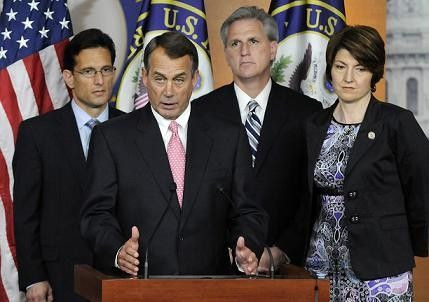Congressional Republicans Favor Letting Payroll Tax Increase to Normal Level
ANALYSIS

Tea Party-dominated Congressional Republicans have made a name for themselves by opposing taxes, but it turns out the caucus does favor increasing a tax that takes a disproportionate amount of income from workers and the poor -- a payroll tax increase that President Barack Obama opposes.
Most Congressional Republicans stridently opposed increasing taxes in Washington's last two battles -- over the federal budget in April and the U.S. debt ceiling in August. Further, the opposition to taxes by Tea Party faction members was even more adamant: Tea Party members opposed even revenue increases -- changes to the tax code that would have eliminated certain tax loop holes.
However, Congressional Republicans are not opposed to raising taxes on what amounts to American citizens who are least likely to vote for them: the GOP says it's o.k. to let a payroll tax extension expire, The Associated Press reported Sunday.
Last December, Congress approved President Obama's request for an extension of the temporary reduction in the payroll tax for Social Security to 4.2 percent from the normal 6.2 percent. The reduction is set to expire Jan. 1, 2012. Employers also pay a 6.2 percent tax in to the Social Security fund.
Obama wants the tax reduction extended as a way to stimulate demand: workers and lower-income individuals are much more likely to spend that extra money, as their incomes are such that they're not likely to have other income sources to pay for essential items. Upper-income individuals are less likely to translate the tax reduction into purchases.
GOP: Two Stances on Tax Increases
Congressional Republicans, who one would expect to be against the tax increase, curiously favor this tax increase.
U.S. Rep. David Camp, R-Mich., and chairman of the tax-writing Ways and Means Committee,and a member of Congress' new super committee tasked with reducing the national debt by another $1.5 trillion by Thanksgiving, told The AP tax reductions, no matter how well-intended, will push the deficit higher, making the super committee's task that much more difficult.
But if the standard is -- let a tax increase occur because not doing so will increase the budget deficit -- why did Congressional Republicans favor extending the 2001 Bush income tax cut a year ago, when it was scheduled to expire on Jan. 1, 2011?
Political operatives say the GOP's double-standard -- opposing tax increases on upper-income Americans while favoring a tax increase on working class and lower-income Americans because not doing so will increase the deficit -- is a stance that may hurt them during the 2012 election.
Political/Public Policy Analysis: In fairness, some Congressional Democrats also favor letting the payroll tax reduction expire, arguing that the Obama administration needs to place more emphasize on protecting social programs during a time of economic stress for many lower-income Americans.
Also in fairness, some Republicans favor extending the payroll tax break: former House Speaker and current 2012 Republican presidential candidate New Gingrich, R-Georgia, favors extending the cut.
That said, the current stance of Congressional Republicans is unacceptable: the caucus should eliminate the double-standard. If the cacus favors tax cuts, everyone should benefit from them -- upper, middle, and lower income citizens.
Finally, perhaps super committee Republicans are just holding out, in order to use the payroll tax extension issue as a bargaining chip in debt reduction negotiations later this autumn, but the inconsistency of the current policy deserves Congress' immediate attention.
© Copyright IBTimes 2024. All rights reserved.





















